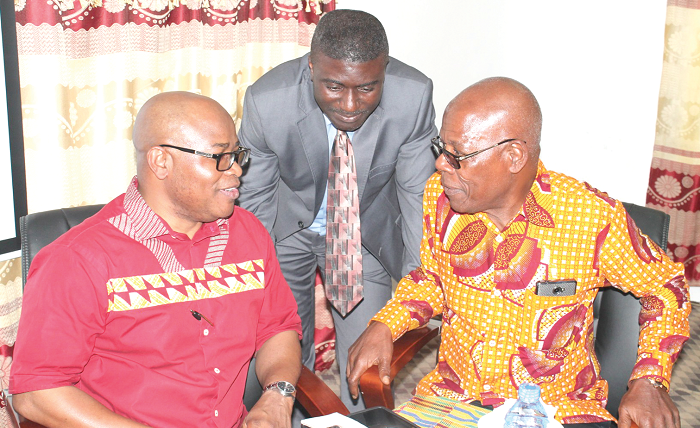
NDC, NPP to split Legislature, Executive - Political scientist predict
Ghana stands the possibility of having the Legislature and the Executive split between the National Democratic Congress (NDC) and the New Patriotic Party (NPP), the Head of the Department of Political Science of the University of Ghana has predicted.
Advertisement
Dr Bossman E. Asare’s observation stems from what has become known as ‘skirt and blouse’ voting where electorates choose to vote for different candidates in the presidential and parliamentary elections.
In the 2012 elections, President John Dramani Mahama was a major beneficiary of such a voting pattern. In the 2012 elections, out of 26 constituencies that voted skirt and blouse, President Mahama won 19, while the NPP candidate, Nana Addo Dankwa Akufo-Addo, won seven.
Three regions--Brong Ahafo, Central and Northern, each voted skirt and blouse in four constituencies followed by the Ashanti and the Upper East regions each of which had three constituencies voting skirt and blouse.
According to Dr Asare, the increasing political consciousness among Ghanaian made the prediction a possibility.
He was delivering a paper on the theme “The Different Political Parties, Presidential Candidates and their Political Platforms,” organised by the department.
Supported by the International Institute for Democracy and Electoral Assistance (International IDEA), the conference brought together political scientists and students to present papers and discuss pertinent issues of the elections such as the different political parties, presidential candidates and their political platforms, the stake for the Ghanaian Youth and the role of gender in the 2016 general election.
Precedent & implication
Although it has never happened in Ghana’s political history, it is not entirely new in world politics. In the United States, for instance, Congress and Senate are controlled by Republicans while the Executive, led by President Barack Obama, is under Democrats’ control.
For many pundits, such a situation in Ghana may cripple governance given the highly polarised nature of the country’s politics. Others also believe it will encourage consensus building, particularly in Parliament, which is viewed by some as a rubber stamping institution.
One-touch victory
Dr Asare also pointed to the possibility of the 2016 elections being won in the first round by either of the two major political parties.
He reasoned that the Progressive People’s Party (PPP) and its candidate, Dr Papa Kwesi Nduom, who was largely seen as a credible candidate, was disqualified by the Electoral Commission to contest hence, there was the possibility of a “one touch” victory for any of the two parties should the status quo remain.
While dismissing the competition from the Convention People’s Party (CPP), he said the Nkrumaists were not different from the ideological stance of the NDC.
The Director of International Idea, Africa and West Asia, Prof. Adebayo Olukoshi, who was the guest of honour for the occasion, urged Ghanaian leaders to transit from the country’s globally acclaimed status as a beacon of democracy on the continent to meet the needs of the populace, including those who believed that there were better prospects outside the country.
Promises spree
The Director of the Centre for European Studies, Prof. Ransford Gyampoh, deplored what he described as promise spree ahead of the elections by political parties.
He said rather than promising what was impossible to achieve, political leaders should prioritise and focus on things that they could do holistically.
He released the report of a study undertaken by the Department of Political Science which points to three key issues—unemployment, poverty and unreliable power supply — as the top three election issues for the 1500 respondents in all 10 regions.
Other issues deemed to be worth the attention of political leaders include corruption, high prices, poor infrastructure and low income.
After the launch of the manifestoes of the two major parties, it has been observed that some of the promises by some political parties made prior to the launch have been studied and described as unmeasurable and unachievable by bodies, including IMANI.
Prof. Gyampoh accused the political parties of denying the electorates issue-based election by deliberatly deciding to launch their manifestoes less than three months to the election.
“How do we digest and understand what they have said to be able to hold them accountable? There is no serious platform to debate some of these manifestoes,” he said.
Situation in 2012
In the 2012 elections, the CPP was the first to launch its manifesto detailing its agenda for the country’s development, in June. The NPP followed in August, with the NDC taking its turn in October. The People’s National Convention (PNC) was the last to put its document out in November.
The PPP did not launch a manifesto for the 2012 polls but had earlier developed what it called the “PPP 10-Point Political Platform Agenda”.
Prof. Gyampoh, a fellow of the Institute of Economic Affairs (IEA), also raised issues with the lack of seriousness the major parties had attached to presidential debates, insisting that “it is not only during party rallies that we can discuss manifestoes.”
Seek accountability
In her paper, entitled “Expanding the Frontiers of Electoral Politics in Ghana, a Senior Lecturer of the department,” Dr Maame Adwoa Gyekye-Jandoh, rallied the youth to “demand accountability from politicians or political elites”.



